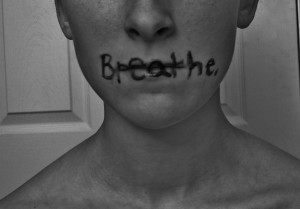6
Feb 13
Are your breathing skills up to par?
 You may be asking yourself, “How could I possibly be breathing incorrectly? I’ve been breathing since I was born, how could I screw it up?” Well, for those of us who have joined the anxiety club, breathing may be something that we just can’t get right. It has been known for a long time that anxiety sufferers tend to hyperventilate more often than the average person (see, for example, this scholarly article or this one). While researchers haven’t really distinguished the directionality of the association (does anxiety cause hyperventilation, or vice versa?), it is clear that a frantic state of breathing exacerbates underlying anxiety.
You may be asking yourself, “How could I possibly be breathing incorrectly? I’ve been breathing since I was born, how could I screw it up?” Well, for those of us who have joined the anxiety club, breathing may be something that we just can’t get right. It has been known for a long time that anxiety sufferers tend to hyperventilate more often than the average person (see, for example, this scholarly article or this one). While researchers haven’t really distinguished the directionality of the association (does anxiety cause hyperventilation, or vice versa?), it is clear that a frantic state of breathing exacerbates underlying anxiety.
Let’s go into a brief explanation of what hyperventilation does to you. When you breathe faster than normal, you are expelling carbon dioxide at a much quicker rate, which would be okay if you were running a marathon and creating more carbon dioxide than usual, but chances are that’s not the case. What happens is that the concentration of CO2 in your blood falls drastically, sending you into a state of respiratory alkalosis – where your blood is more basic (less acidic) than it should be. This increase in pH is interpreted as a signal that you have too much oxygen in your blood (which isn’t true), so your blood vessels constrict and less oxygen makes it to your brain. Low oxygen levels in your brain give you the characteristic symptoms of labored breathing: numbness/tingling, lightheadedness, dizziness, headache and fainting. You might notice that these symptoms sound a bit like a panic attack. Cue the “Aha!” moment.
So how can you avoid hyperventilation, you might ask? Here are some simple steps you can take to reduce your anxiety through proper breathing techniques.
- Monitor your breathing during periods of increased anxiousness. Make the effort to start noticing your breathing patterns – do you hyperventilate more when you’re anxious? If you don’t, then maybe you are already breathing correctly. Chances are that either way, you’ll benefit from learning proper technique.
- Does your stomach expand or retract when you breathe? If your stomach is expanding, then you’re breathing correctly. If not, then you need to work on your technique. Correct, deep breathing is about expanding your diaphragm to get the most air you can. Slow, deep breathing will actually activate your parasympathetic nervous system (the so-called “rest and digest” system) that will calm you down. Incorrect “chest” breathing will not help.
- Try some breathing exercises every day. Make room in your day for 10 minutes of deep breathing. You can train your body to breathe more effectively if you just take the time to do so. Here is a resource that I found helpful when I was learning proper breathing technique.
- Take deep breaths when you feel anxiety coming on. Remember that deep breathing will calm you down. It certainly won’t eliminate all of your anxiety, but I’ve generally found that if I focus on my breathing when I feel a panic attack coming on, I can calm myself down in time to get through whatever situation I’m stuck in.
Diaphragmatic breathing is an important tool for anyone suffering from anxiety or high stress levels. Deep breathing even feels calmer, and sometimes the difference between labored breathing and calm breathing can be all it takes to ward off panic attacks or drag you out of a state of prolonged anxiousness.







